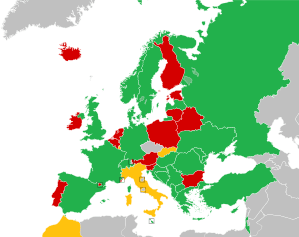Eurovision Song Contest 2005
The Eurovision Song Contest 2005 was the 50th edition of the annual Eurovision Song Contest. It took place in Kyiv, Ukraine, following Ruslana's win at the 2004 contest in Istanbul, Turkey with the song "Wild Dances". It was the first time Ukraine had hosted the contest - only 2 years after the country made its debut. Organised by the European Broadcasting Union (EBU) and host broadcaster National Television Company of Ukraine (NTU), the contest was held at the Palace of Sports, and consisted of a semi-final on 19 May, and the final on 21 May 2005. The two live shows were hosted by Maria Efrosinina and Pavlo Shylko.
| Eurovision Song Contest 2005 | |
|---|---|
| Awakening | |
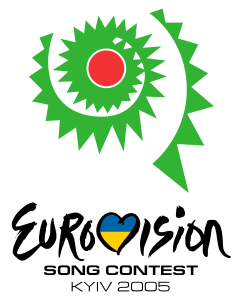 | |
| Dates | |
| Semi-final | 19 May 2005 |
| Final | 21 May 2005 |
| Host | |
| Venue | Palace of Sports Kiev, Ukraine |
| Presenter(s) |
|
| Directed by | Sven Stojanovic |
| Executive supervisor | Svante Stockselius |
| Executive producer | Pavlo Grytsak |
| Host broadcaster | National Television Company of Ukraine (NTU) |
| Opening act |
|
| Interval act |
|
| Website | eurovision |
| Participants | |
| Number of entries | 39 |
| Debuting countries | |
| Returning countries | |
| Non-returning countries | None |
Participation map
| |
| Vote | |
| Voting system | Each country awarded 12, 10, 8–1 points to their 10 favourite songs. |
| Nul points | None |
| Winning song | |
Thirty-nine countries participated in the contest, three more than the previous record of thirty-six, that took part the year before. Bulgaria and Moldova made their first participation this year, while Hungary returned to the contest after their six-year absence, having last taken part in 1998.
The winner was Greece with the song "My Number One", performed by Helena Paparizou and written by Christos Dantis and Natalia Germanou. This was Greece's first victory in the contest, in 31 years of participation. Malta, Romania, Israel and Latvia rounded out the top five. Malta equalled their best result from 2002, while Romania achieved their best result in their Eurovision history. Unusually, all "Big Four" countries (France, Germany, Spain and United Kingdom) ended up as the "Last Four", all placing in the bottom four positions in the final.
Organizers hoped that by hosting Eurovision, it would boost Ukraine's image abroad and increase tourism, while the country's new government hoped that it would also give a modest boost to the long-term goal of acquiring European Union membership.
This was also the first edition to be broadcast in widescreen 16:9 format.[1]
Location
Kiev is the capital and largest city of Ukraine, located in the north central part of the country on the Dnieper. The Palace of Sports, a multi-purpose indoor arena, was confirmed by officials as the host venue in September 2004.[2] However, in order to host the contest, the facilities had been brought up to the standard required by the European Broadcasting Union (EBU).
At the end of December 2004, work began on the renovation of the hall,[3] for which approximately 4 million francs were allocated.[4] Renovation works were to be finished by 20 April,[5] however, they were completed at the beginning of May.[6][7] The arena could accommodate over 5,000 seated spectators. Additionally 2,000 press delegates were catered for.
Hotel rooms were scarce as the contest organisers asked the Ukrainian government to put a block on bookings they did not control themselves through official delegation allocations or tour packages: this led to many people's hotel bookings being cancelled.[8]
Overview
The official logo of the contest remained the same from the 2004 contest with the country's flag in the heart being changed. Following Istanbul's 'Under The Same Sky', the slogan for the 2005 show was 'Awakening', which symbolised the awakening of the country and city ready to present itself to Europe. The postcards (short clips shown between performances) for the 2005 show illustrated Ukraine's culture and heritage along with a more modern and industrial side to the country.
The hosts of the Eurovision Song Contest in Kiev were television presenter Maria "Masha" Efrosinina and DJ Pavlo "Pasha" Shylko. Previous winner Ruslana returned to the stage in Kiev to perform in the interval act and to interview the contestants backstage in the 'green room'. The famous Ukrainian boxers Vitali and Wladimir Klitschko opened the televoting, while a special trophy was presented to the winner by Ukraine's president, Viktor Yushchenko.
Publicity
An official CD and DVD was released and a new introduction was an official pin set, which contains heart-shaped pins with the flags of all thirty-nine participating countries. The EBU also commissioned a book "The Eurovision Song Contest – The Official History" by British/American author John Kennedy O'Connor to celebrate the contest's fiftieth anniversary.[9] The book was presented on screen during the break between songs 12 and 13 (Serbia and Montenegro, Denmark). The book was published in English, German, French, Dutch, Swedish, Danish and Finnish.
During the semi final, there were a few sound faults, most notably during the Norwegian song, shortly after the intro and also during the Irish song. These were not fixed for the DVD release.
Incidents
2005 was no exception for scandals regarding the representatives from the countries participating. Germany's entrant in the Eurovision Song Contest rejected calls to quit after her producer admitted manipulating the country's pop charts with mass purchases of her single.
Gracia Baur defended her producer David Brandes, also behind Swiss entry Vanilla Ninja, and said she would go to the finals in Kiev despite complaints from other German singers. Bulgaria's debut was overshadowed by a scandal. The song "Lorraine" by Kaffe was accused of plagiarism. The song sounded too similar to another one released by Ruslan Mainov in 2001. There were also problems in Malta with the electricity supply during the contest, so TV viewers were unable to watch their national selection from the very beginning. There was a controversy regarding the Turkish entry: TRT got a false jury which led to the victory of the song Gülseren, which the 2003 winner Sertab Erener said was not the best choice. There were similar controversies in Macedonia which led to an eventual victory for Martin Vučić. The Ukrainian song had to be changed because it would bring a political message to the people, and EBU stated that no politics could be involved in the contest. The entry for Serbia and Montenegro was also overshadowed by a scandal and an accusation of plagiarism. Portugal's entry, "Amar", had very poor sound quality, with the female singer's microphone failing many times on stage.
It is also notable that the programme lasted just short of 3.5 hours. This was mainly due to the extremely long voting procedure, where 39 countries voted, reading out every single score. Many people, including United Kingdom commentator Terry Wogan, noticed this and commented about the marathon-like voting procedure, when Russia voted he stated "How many more [countries] have we got to go? What time is it?". Because the show overran so badly, the EBU changed the way the votes were announced in 2006 into a much shorter method, where only the top 3 scores were read out (the rest appeared on the scoreboard automatically).
Ruslana was also intended to be a presenter for the show, but was pulled out before the contest for numerous reasons, including her poor English skills. She opened the contest, and did do a few brief interviews in the green room at a few different stages in the event.
In the semifinal, the first qualifier was Hungary as shown on the card, but instead of showing Hungary's flag, it showed the Bulgarian flag accidentally.
Participating countries
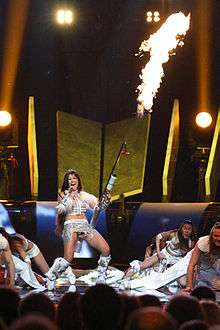
Thirty-nine countries participated in the 2005 Contest. Hungary returned to the contest after a six-year absence, last competing in 1998. Bulgaria and Moldova competed in the contest for the first time.
Returning artists
Constantinos Christoforou represented Cyprus for the third time, having previously represented the nation at the 1996 contest as a solo artist and at the 2002 contest as part of the group One. Helena Paparizou previously represented Greece in 2001 as part of the duo Antique. Selma previously represented Iceland in 1999. Chiara previously represented Malta in 1998, and would return again in 2009. Anabel Conde, who represented Spain in 1995, returned as a backing vocalist for Andorra.
Results
Semi-final
The semi-final was held on 19 May 2005 at 21:00 (CET). 25 countries performed and all 39 participants voted.
Shaded countries qualified for the Eurovision Final
Final
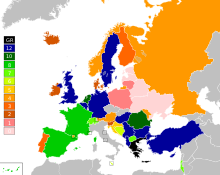
The finalists were:
- the four automatic qualifiers France, Germany, Spain and the United Kingdom;
- the top 10 countries from the 2004 final (other than the automatic qualifiers);
- the top 10 countries from the 2005 semi-final.
The final was held on 21 May 2005 at 21:00 (CET) and was won by Greece.
Countries in bold automatically qualified for the Eurovision Song Contest 2006 Final.
Notes
Scoreboard
The EBU introduced an undisclosed threshold number of televotes that would have to be registered in each voting country in order to make that country's votes valid. If that number was not reached, the country's backup jury would vote instead. In the semi-final this affected Monaco, Andorra and Albania, and Andorra, Monaco and Moldova in the final.
Semi-final
| Voting procedure used: 100% Televoting 100% Jury vote |
Televoting results | ||||||||||||||||||||||||||||||||||||||||
|---|---|---|---|---|---|---|---|---|---|---|---|---|---|---|---|---|---|---|---|---|---|---|---|---|---|---|---|---|---|---|---|---|---|---|---|---|---|---|---|---|---|
| Austria | 30 | 7 | 10 | 5 | 1 | 1 | 6 | ||||||||||||||||||||||||||||||||||
| Lithuania | 17 | 5 | 4 | 8 | |||||||||||||||||||||||||||||||||||||
| Portugal | 51 | 10 | 5 | 12 | 12 | 12 | |||||||||||||||||||||||||||||||||||
| Moldova | 207 | 8 | 10 | 8 | 10 | 8 | 4 | 5 | 3 | 6 | 3 | 7 | 6 | 6 | 5 | 12 | 1 | 12 | 3 | 8 | 1 | 10 | 6 | 10 | 12 | 4 | 6 | 12 | 6 | 10 | 5 | ||||||||||
| Latvia | 85 | 12 | 4 | 7 | 2 | 10 | 6 | 6 | 12 | 3 | 2 | 6 | 5 | 2 | 7 | 1 | |||||||||||||||||||||||||
| Monaco | 22 | 10 | 2 | 10 | |||||||||||||||||||||||||||||||||||||
| Israel | 158 | 2 | 6 | 12 | 12 | 10 | 3 | 1 | 12 | 4 | 7 | 4 | 5 | 6 | 6 | 8 | 6 | 5 | 7 | 3 | 4 | 3 | 4 | 1 | 5 | 3 | 8 | 3 | 8 | ||||||||||||
| Belarus | 67 | 3 | 1 | 12 | 1 | 7 | 3 | 7 | 2 | 6 | 4 | 8 | 10 | 3 | |||||||||||||||||||||||||||
| Netherlands | 53 | 8 | 12 | 5 | 4 | 2 | 8 | 1 | 5 | 6 | 2 | ||||||||||||||||||||||||||||||
| Iceland | 52 | 6 | 3 | 8 | 10 | 2 | 4 | 10 | 7 | 2 | |||||||||||||||||||||||||||||||
| Belgium | 29 | 12 | 6 | 3 | 1 | 7 | |||||||||||||||||||||||||||||||||||
| Estonia | 31 | 5 | 6 | 1 | 2 | 1 | 1 | 3 | 12 | ||||||||||||||||||||||||||||||||
| Norway | 164 | 2 | 6 | 1 | 5 | 2 | 12 | 2 | 6 | 12 | 2 | 10 | 3 | 7 | 7 | 3 | 7 | 2 | 8 | 2 | 4 | 7 | 4 | 12 | 8 | 2 | 6 | 4 | 7 | 5 | 6 | ||||||||||
| Romania | 235 | 10 | 10 | 7 | 3 | 8 | 5 | 8 | 1 | 4 | 4 | 5 | 8 | 1 | 8 | 12 | 8 | 10 | 7 | 7 | 12 | 12 | 12 | 12 | 5 | 7 | 5 | 5 | 1 | 7 | 1 | 12 | 3 | 5 | 4 | 6 | |||||
| Hungary | 167 | 7 | 7 | 4 | 7 | 6 | 4 | 5 | 1 | 7 | 4 | 12 | 1 | 2 | 10 | 6 | 8 | 6 | 3 | 8 | 8 | 1 | 3 | 4 | 10 | 8 | 5 | 7 | 3 | 1 | 5 | 4 | |||||||||
| Finland | 50 | 6 | 1 | 8 | 3 | 10 | 8 | 10 | 4 | ||||||||||||||||||||||||||||||||
| Macedonia | 97 | 4 | 3 | 3 | 10 | 8 | 4 | 10 | 12 | 10 | 1 | 2 | 12 | 10 | 8 | ||||||||||||||||||||||||||
| Andorra | 27 | 7 | 4 | 6 | 10 | ||||||||||||||||||||||||||||||||||||
| Switzerland | 114 | 1 | 8 | 2 | 2 | 8 | 6 | 12 | 10 | 3 | 2 | 5 | 5 | 3 | 1 | 2 | 2 | 5 | 3 | 2 | 2 | 4 | 3 | 6 | 3 | 3 | 2 | 2 | 7 | ||||||||||||
| Croatia | 169 | 12 | 4 | 3 | 5 | 1 | 4 | 4 | 1 | 3 | 2 | 8 | 12 | 3 | 8 | 6 | 4 | 6 | 10 | 12 | 6 | 12 | 7 | 10 | 12 | 10 | 4 | ||||||||||||||
| Bulgaria | 49 | 5 | 7 | 4 | 10 | 6 | 1 | 8 | 7 | 1 | |||||||||||||||||||||||||||||||
| Ireland | 53 | 2 | 2 | 1 | 2 | 10 | 12 | 5 | 5 | 4 | 1 | 5 | 4 | ||||||||||||||||||||||||||||
| Slovenia | 69 | 3 | 4 | 2 | 1 | 7 | 2 | 8 | 1 | 7 | 7 | 3 | 10 | 6 | 8 | ||||||||||||||||||||||||||
| Denmark | 185 | 6 | 7 | 5 | 10 | 12 | 10 | 7 | 7 | 8 | 8 | 12 | 10 | 7 | 10 | 4 | 3 | 12 | 8 | 12 | 5 | 6 | 2 | 4 | 7 | 2 | 1 | ||||||||||||||
| Poland | 81 | 5 | 1 | 6 | 5 | 3 | 5 | 4 | 5 | 1 | 7 | 2 | 8 | 8 | 2 | 10 | 5 | 1 | 3 | ||||||||||||||||||||||
12 points
Below is a summary of all 12 points in the semi-final:
| N. | Contestant | Voting nation |
|---|---|---|
| 6 | Romania | Cyprus, Greece, Hungary, Israel, Moldova, Spain |
| 5 | Croatia | Austria, Bosnia and Herzegovina, Macedonia, Serbia and Montenegro, Slovenia |
| 4 | ||
| Denmark | Ireland, Netherlands, Norway, Sweden | |
| Moldova | Romania, Russia, Turkey, Ukraine | |
| 3 | ||
| Israel | Andorra, Belarus, Monaco | |
| Norway | Denmark, Finland, Iceland | |
| Portugal | France, Germany, Switzerland | |
| 2 | ||
| Latvia | Lithuania, Malta | |
| Macedonia | Albania, Croatia | |
| 1 | ||
| Belarus | Bulgaria | |
| Belgium | Portugal | |
| Estonia | Latvia | |
| Hungary | Poland | |
| Ireland | United Kingdom | |
| Netherlands | Belgium | |
| Switzerland | Estonia |
Final
| Voting procedure used: 100% Televoting 100% Jury vote |
Televoting results | ||||||||||||||||||||||||||||||||||||||||
|---|---|---|---|---|---|---|---|---|---|---|---|---|---|---|---|---|---|---|---|---|---|---|---|---|---|---|---|---|---|---|---|---|---|---|---|---|---|---|---|---|---|
| Hungary | 97 | 2 | 2 | 6 | 2 | 3 | 6 | 5 | 10 | 8 | 6 | 7 | 5 | 8 | 6 | 1 | 2 | 6 | 2 | 3 | 1 | 3 | 3 | ||||||||||||||||||
| United Kingdom | 18 | 8 | 4 | 1 | 5 | ||||||||||||||||||||||||||||||||||||
| Malta | 192 | 5 | 2 | 5 | 5 | 5 | 4 | 8 | 4 | 8 | 10 | 1 | 5 | 10 | 2 | 10 | 8 | 4 | 6 | 7 | 10 | 10 | 6 | 10 | 8 | 4 | 8 | 12 | 3 | 5 | 7 | ||||||||||
| Romania | 158 | 6 | 12 | 4 | 1 | 3 | 5 | 7 | 7 | 8 | 5 | 7 | 10 | 7 | 6 | 4 | 7 | 5 | 8 | 12 | 12 | 3 | 3 | 2 | 2 | 5 | 2 | 5 | |||||||||||||
| Norway | 125 | 5 | 4 | 1 | 12 | 3 | 8 | 12 | 2 | 1 | 4 | 4 | 8 | 5 | 5 | 3 | 3 | 3 | 1 | 2 | 12 | 8 | 6 | 4 | 3 | 6 | |||||||||||||||
| Turkey | 92 | 7 | 12 | 10 | 3 | 1 | 3 | 8 | 8 | 4 | 10 | 8 | 6 | 12 | |||||||||||||||||||||||||||
| Moldova | 148 | 2 | 10 | 10 | 7 | 8 | 1 | 6 | 6 | 3 | 3 | 4 | 2 | 2 | 12 | 7 | 2 | 4 | 4 | 5 | 5 | 12 | 1 | 1 | 7 | 10 | 4 | 8 | 2 | ||||||||||||
| Albania | 53 | 3 | 2 | 8 | 12 | 2 | 10 | 5 | 10 | 1 | |||||||||||||||||||||||||||||||
| Cyprus | 46 | 10 | 3 | 12 | 1 | 7 | 1 | 12 | |||||||||||||||||||||||||||||||||
| Spain | 28 | 8 | 12 | 4 | 4 | ||||||||||||||||||||||||||||||||||||
| Israel | 154 | 1 | 3 | 5 | 12 | 8 | 7 | 6 | 1 | 5 | 8 | 6 | 8 | 7 | 8 | 7 | 5 | 3 | 6 | 3 | 6 | 5 | 1 | 7 | 5 | 8 | 1 | 2 | 10 | ||||||||||||
| Serbia and Montenegro | 137 | 12 | 6 | 3 | 4 | 4 | 10 | 2 | 6 | 1 | 6 | 10 | 4 | 10 | 3 | 3 | 12 | 6 | 6 | 10 | 12 | 1 | 6 | ||||||||||||||||||
| Denmark | 125 | 4 | 1 | 10 | 8 | 10 | 4 | 5 | 2 | 3 | 7 | 5 | 6 | 8 | 3 | 4 | 12 | 10 | 3 | 10 | 6 | 4 | |||||||||||||||||||
| Sweden | 30 | 3 | 6 | 1 | 5 | 2 | 7 | 6 | |||||||||||||||||||||||||||||||||
| Macedonia | 52 | 1 | 7 | 5 | 5 | 10 | 7 | 8 | 7 | 2 | |||||||||||||||||||||||||||||||
| Ukraine | 30 | 7 | 12 | 8 | 1 | 2 | |||||||||||||||||||||||||||||||||||
| Germany | 4 | 2 | 2 | ||||||||||||||||||||||||||||||||||||||
| Croatia | 115 | 8 | 6 | 7 | 2 | 1 | 2 | 1 | 2 | 12 | 2 | 7 | 5 | 2 | 2 | 10 | 8 | 8 | 2 | 1 | 12 | 8 | 7 | ||||||||||||||||||
| Greece | 230 | 4 | 1 | 3 | 10 | 2 | 12 | 3 | 4 | 12 | 2 | 2 | 1 | 12 | 12 | 6 | 10 | 4 | 12 | 4 | 12 | 12 | 8 | 7 | 12 | 2 | 12 | 7 | 12 | 5 | 4 | 6 | 7 | 8 | |||||||
| Russia | 57 | 7 | 12 | 7 | 7 | 10 | 4 | 10 | |||||||||||||||||||||||||||||||||
| Bosnia and Herzegovina | 79 | 10 | 6 | 1 | 8 | 4 | 7 | 10 | 4 | 4 | 7 | 3 | 10 | 5 | |||||||||||||||||||||||||||
| Switzerland | 128 | 8 | 4 | 8 | 10 | 7 | 12 | 10 | 1 | 3 | 6 | 6 | 3 | 1 | 3 | 4 | 2 | 1 | 5 | 5 | 4 | 3 | 3 | 7 | 12 | ||||||||||||||||
| Latvia | 153 | 12 | 6 | 6 | 3 | 5 | 10 | 4 | 10 | 12 | 7 | 4 | 1 | 6 | 10 | 8 | 12 | 1 | 6 | 6 | 3 | 1 | 7 | 7 | 1 | 5 | |||||||||||||||
| France | 11 | 5 | 1 | 5 | |||||||||||||||||||||||||||||||||||||
12 points
Below is a summary of all 12 points in the final:
| N. | Contestant | Voting nation |
|---|---|---|
| 10 | Greece | Albania, Belgium, Bulgaria, Cyprus, Germany, Hungary, Serbia and Montenegro, Sweden, Turkey, United Kingdom |
| 3 | Latvia | Ireland, Lithuania, Moldova |
| Norway | Denmark, Finland, Iceland | |
| Romania | Israel, Spain, Portugal | |
| Serbia and Montenegro | Austria, Croatia, Switzerland | |
| 2 | Croatia | Bosnia and Herzegovina, Slovenia |
| Cyprus | Greece, Malta | |
| Moldova | Romania, Ukraine | |
| Switzerland | Estonia, Latvia | |
| Turkey | France, Netherlands | |
| 1 | Albania | Macedonia |
| Denmark | Norway | |
| Israel | Monaco | |
| Malta | Russia | |
| Russia | Belarus | |
| Spain | Andorra | |
| Ukraine | Poland |
Other countries


Awards
Marcel Bezençon Awards
The Marcel Bezençon Awards were first handed out during the Eurovision Song Contest 2002 in Tallinn, Estonia honoring the best competing songs in the final. Founded by Christer Björkman (Sweden's representative in the 1992 Eurovision Song Contest and current Head of Delegation for Sweden) and Richard Herrey (member of the Herreys, Eurovision Song Contest 1984 winner from Sweden), the awards are named after the creator of the annual competition, Marcel Bezençon.[14] The awards are divided into 3 categories; Press Award; Artistic Award; and Composer Award.[15]
| Category | Country | Song | Performer(s) | Composer(s) | Final result | Points |
|---|---|---|---|---|---|---|
| Artists Award (Voted by previous winners) |
"My Number One" | Helena Paparizou | Christos Dantis Natalia Germanou |
1st | 230 | |
| Composer Award | "Zauvijek moja" | No Name | Slaven Knezović Milan Perić |
7th | 137 | |
| Press Award | "Angel" | Chiara | Chiara Siracusa | 2nd | 192 |
Barbara Dex Award
The Barbara Dex Award has been annually awarded by the fan website House of Eurovision since 1997, and is a humorous award given to the worst dressed artist each year in the contest. It is named after the Belgian artist, Barbara Dex, who came last in the 1993 contest, in which she wore her own self designed (awful) dress.[16]
| Place[17] | Country[17] | Performer(s)[17] | Votes[17] |
|---|---|---|---|
| 1 | Martin Vučić | 42 | |
| 2 | Selma | 39 | |
| 3 | 2B | 34 | |
| 4 | Wig Wam | 29 | |
| 5 | Angelica Agurbash | 21 | |
International broadcasts and voting
Voting and spokespersons
The order in which each country announced their votes was compiled by placing the countries that failed to qualify from the semi-final first in the running order they performed in during the semi-final, followed by the finalists which voted in the order they performed in during the final. The spokespersons are shown alongside each country.[18]




.svg.png)


.svg.png)

(participant for Estonia in 1996 and 1997)
(participant for Finland in 2004)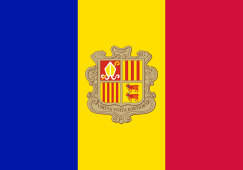


(winner for Ireland in 1970)



(winner for United Kingdom in 1981 as part of Bucks Fizz)
(Co-presenter of the Junior Eurovision Song Contest 2016)


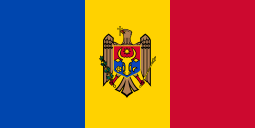

.svg.png)


%3B_Flag_of_Serbia_and_Montenegro_(2003%E2%80%932006).svg.png)

(participant for Denmark in 1983)
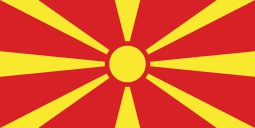
(participant for Macedonia in 2002 and in 2007)







(winner for Latvia in 2002 and co-presenter in 2003)
(winner for France in 1977)
Commentators
Participating countries



.svg.png)
.svg.png)



.svg.png)






















%3B_Flag_of_Serbia_and_Montenegro_(2003%E2%80%932006).svg.png)







Non-participating countries
Official album
| Eurovision Song Contest: Kyiv 2005 | ||||
|---|---|---|---|---|
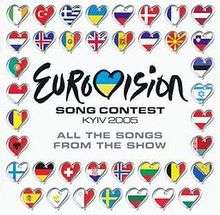 | ||||
| Compilation album by | ||||
| Released | 2 May 2005 | |||
| Genre | Pop | |||
| Length |
| |||
| Label | EMI / CMC | |||
| Eurovision Song Contest chronology | ||||
| ||||
| Original cover | ||||
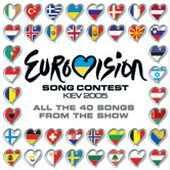 The original album cover of the compilation, showing the participation of Lebanon. (bottom row, third from right) | ||||
Eurovision Song Contest: Kyiv 2005 was the official compilation album of the 2005 Contest, put together by the European Broadcasting Union and released by EMI Records and CMC International on 2 May 2005. The album featured all 39 songs that entered in the 2005 contest, including the semi-finalists that failed to qualify into the grand final.[41]
The original cover designed for the album was changed after Lebanon's withdrawal from the Eurovision Song Contest 2005 after announcing they would show advertisements over the Israeli entry. Had they entered, they would have been on track 4, disc 2 with the song "Quand tout s'enfuit" by Aline Lahoud.[42]
It was reported that sales of the 2005 Eurovision merchandise reached record-breaking levels.[43]
Charts
| Chart (2005) | Peak position |
|---|---|
| German Compilation Albums (Offizielle Top 100)[44] | 2 |
See also
- The Eurovision Song Contest – The Official History by John Kennedy O'Connor. Carlton Books, UK ISBN 978-1-84442-994-3
References
- Murray, Richard. "The Eurovision Song Contest 2005". Retrieved 25 March 2020.
- "Eurovision NTU and EBU confirm: Palats Sportu - ESCToday.com". 6 September 2004. Retrieved 8 April 2018.
- "Eurovision Renovation of Palats Sportu has begun". ESCToday.com. 26 December 2004. Retrieved 8 April 2018.
- "Eurovision NTU President doubts about Palats Sportu expenses". ESCToday.com. 27 April 2005. Retrieved 8 April 2018.
- "Eurovision 'Palats Sportu must be finished by 20 April'". ESCToday.com. 27 February 2005. Retrieved 8 April 2018.
- "Eurovision Kyiv: The stage is taking shape". ESCToday.com. 4 May 2005. Retrieved 8 April 2018.
- "Eurovision Palats Sportu scene is getting ready". ESCToday.com. 11 May 2005. Retrieved 8 April 2018.
- Marone, John. "Where Do We Put The Foreign Tourists?". The Ukrainian Observer. Archived from the original on 4 February 2006. Retrieved 18 July 2006.
- O'Connor, John Kennedy. The Eurovision Song Contest – The Official History. Carlton Books, UK ISBN 978-1-84442-994-3
- "Eurovision Song Contest 2005". The Diggiloo Thrush. Retrieved 5 March 2012.
- "Lyrics of "Razom nas bahato"". Lyricstranslate.com.
- Bakker, Sietse (3 December 2004). "CZECH REPUBLIC WITHDRAWS". Esctoday.com. Retrieved 13 September 2014.
- Bakker, Sietse (18 March 2005). "BREAKING NEWS: LEBANON WITHDRAWS". Esctoday.com. Retrieved 9 August 2008.
- "Marcel Bezençon Award - an introduction". Poplight. Archived from the original on 17 October 2013. Retrieved 2 June 2009.
- "Winners of the Marcel Bezençon Awards 2012 | News | Eurovision Song Contest - Baku 2012". Eurovision.tv. Retrieved 9 August 2012.
- van Thillo, Edwin. "Barbara Dex Award". Archived from the original on 7 May 2016. Retrieved 24 June 2014.
- Van Bedts, Raf (25 May 2005). "Martin Vucic wint Barbara Dex-award 2005". eurosong.be (in Dutch). eurosong.be. Retrieved 13 September 2014.
- Philips, Roel (17 May 2005). "The 39 spokespersons!". ESCToday. Archived from the original on 19 December 2005. Retrieved 17 May 2005.
- Christian Masson. "2005 - Kiev". Songcontest.free.fr. Retrieved 4 July 2012.
- "Congratulations: 50 jaar Songfestival!". VRTFansite.be. Archived from the original on 25 March 2012. Retrieved 4 July 2012.
- "Pogledajte temu - Prijedlog - Eurosong večer(i) na HRT-u!". forum.hrt.hr. Archived from the original on 14 March 2012. Retrieved 4 July 2012.
- Savvidis, Christos (OGAE Cyprus)
- "Forside". esconnet.dk. Archived from the original on 24 March 2012. Retrieved 9 August 2012.
- Archived 2 September 2011 at the Wayback Machine
- "Selostajat ja taustalaulajat läpi vuosien? • Viisukuppila". Viisukuppila.fi. Retrieved 4 July 2012.
- Julkaistu To, 29/04/2010 - 10:19 (29 April 2010). "YLE Radio Suomen kommentaattorit | Euroviisut | yle.fi | Arkistoitu". yle.fi. Retrieved 4 July 2012.
- "Dr. Peter Urban kommentiert - Düsseldorf 2011". Duesseldorf2011.de. Archived from the original on 24 March 2012. Retrieved 4 July 2012.
- "Thomas Mohr: Mit Dschinghis Khan im Garten". Eurovision.de. 14 May 2011. Retrieved 28 October 2012.
- Archived 8 October 2011 at the Wayback Machine
- "Fréttablaðið, 21.05.2005". Timarit.is. Retrieved 4 July 2012.
- "RTE so lonely after loss of Gerry – Marty". 20 May 2010. Retrieved 29 May 2010.
He has been providing commentary for Irish viewers since 2000 and maintains great enthusiasm for the much lampooned contest.
- Archived 12 February 2010 at the Wayback Machine
- "Welkom op de site van Eurovision Artists". Eurovisionartists.nl. Retrieved 4 July 2012.
- "Adresse Kiev - NRK". Nrk.no. Archived from the original on 18 June 2012. Retrieved 4 July 2012.
- "Pliki użytkownika Eurowizja". Chomikuj.pl. Retrieved 4 July 2012.
- "Comentadores Do ESC - escportugalforum.pt.vu | o forum eurovisivo português". 21595.activeboard.com. Archived from the original on 21 April 2012. Retrieved 4 July 2012.
- "FORO FESTIVAL DE EUROVISIÓN • Ver Tema - Uribarri comentarista Eurovision 2010". Eurosongcontest.phpbb3.es. Archived from the original on 17 March 2012. Retrieved 4 July 2012.
- "Infosajten.com". Infosajten.com. Archived from the original on 18 July 2012. Retrieved 9 August 2012.
- "Swedes stay at home with Eurovision fever". The Local. 16 May 2009. Archived from the original on 15 May 2013. Retrieved 29 September 2012.
- "10 обранців приєднаються до 14 уже відібраних учасників конкурсу Євробачення, фінальне змагання відбудеться завтра - Новости на Киев 2000". Kiev2000.com. 20 May 2005. Retrieved 4 July 2012.
- Sietse Bakker (9 March 2005). "Pre-order the official 2005 album and DVD". esctoday.com. ESCToday. Retrieved 5 November 2014.
- Sietse Bakker (18 March 2005). "Lebanon withdraws". esctoday.com. ESCToday. Retrieved 5 November 2014.
- Phillips, Roel (19 May 2005). "Record sales of Eurovision merchandising". esctoday.com. ESCTOday. Retrieved 5 November 2014.
- "Eurovision Song Contest 2005". Offiziellecharts.de. GfK Entertainment Charts. Retrieved 17 March 2018.
External links
| Wikimedia Commons has media related to Eurovision Song Contest 2005. |
